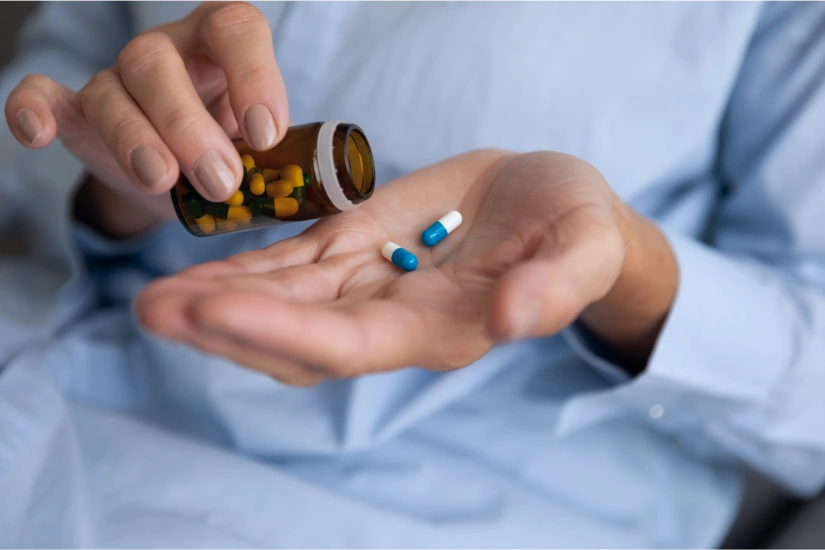24/7 Helpline:
(866) 899-221924/7 Helpline:
(866) 899-2219
Learn more about Opioid Rehab centers in Morgan County
Opioid Rehab in Other Counties

Other Insurance Options

Coventry Health Care

MVP Healthcare

CareFirst

Self-pay options

Absolute Total Care

BlueShield

Regence

PHCS Network

Health Net

CareSource
Beacon

Highmark

EmblemHealth

Private insurance

Aetna

United Health Care

Health Partners

Meritain

Holman Group

Ceridian

OMA – Outreach Ministries of Alabama
OMA - Outreach Ministries of Alabama, located in Valhermoso Springs, Alabama, provides alcohol and d...

Decatur Health and Rehabilitation Center
Decatur Health and Rehabilitation Center provides comprehensive inpatient care for seniors in Decatu...

Alliance Recovery
Alliance Recovery Center provides outpatient medication assisted treatment for opioid use disorder a...

Breakthru House
Breakthru House is a private rehab located in Decatur, GA. Breakthru House specializes in the treatm...

Venerable Counseling Services
Venerable Counseling Services is a private rehab located in Decatur, Georgia. Venerable Counseling S...

Circle of Recovery
Circle of Recovery is a private rehab located in Decatur, GA. Circle of Recovery specializes in the ...

Recovery Consultants of Atlanta
Recovery Consultants of Atlanta is a non-profit, faith-based, peer-led Recovery Community Organizati...

Marvelous Light Consultants
Marvelous Light Consultants offers outpatient treatment for individuals with substance addiction and...

DeKalb Community Service Board
DeKalb Community Service Board (CSB) is a public provider of community-based mental health, addictio...

Renaissance Counseling Services
Renaissance Counseling Services is a private rehab located in Decatur, Georgia. Renaissance Counseli...

Caring Works – Hope House
Caring Works – Hope House is a private rehab located in Decatur, Georgia. Caring Works – Hope House ...

Newport Integrated Behavioral Health
Newport Integrated Behavioral Health - Moseri Road provides integrated behavioral, psychiatric, and ...

National Youth Advocate Program – Atlanta
National Youth Advocate Program – Atlanta is a private rehab located in Decatur, Georgia. National Y...

DeKalb CSB – Fox Recovery Center
DeKalb CSB - Fox Recovery Center is a 28 day residential substance abuse program organized to provid...

DeKalb Community Service Board – Addiction Clinic
DeKalb Community Service Board - Addiction Clinic provides treatment including group counseling, ind...

A and E Behavioral Healthcare Associates
A and E Behavioral Healthcare Associates is a private rehab located in Decatur, Illinois. A and E Be...

Heritage Behavioral Health
Heritage Behavioral Health provides comprehensive community-based services to treat the most serious...

New Directions Treatment
New Directions Treatment is a private rehab located in Danville, Illinois. New Directions Treatment ...

Saint Mary’s Treatment Center
Saint Mary’s Treatment Center is a private rehab located in Decatur, Illinois. Saint Mary’s Treatmen...

Alpha Omega Counseling Services
Alpha Omega Counseling Services is a private rehab located in Danville, Illinois. Alpha Omega Counse...

Rosecrance Danville – East Voorhees Street
Rosecrance is a non-profit traditional rehab located in Danville, Illinois. Rosecrance specializes i...

Decatur Community Based Outpatient Clinic
Decatur Community Based Outpatient Clinic strives to be a patient-centered integrated health care or...

Rosecrance Danville
Rosecrance Danville is a non-profit rehab located in Danville, Illinois. Rosecrance Danville special...

VA Illiana Health Care System – Decatur Community Based Outpatient Clinic
VA Illiana Health Care System - Decatur Community Based Outpatient Clinic strives to be a patient-ce...

Spero Health – Danville (KY)
Spero Health – Danville (KY) is a private rehab located in Danville, Kentucky. Spero Health – Danvil...

Central Kentucky Psychiatry
Central Kentucky Psychiatry is a behavioral health care and mental health treatment program. If addi...

Danville Outpatient Clinic
Danville Outpatient Clinic is a drug and alcohol rehab located in Danville, Kentucky. They offer mul...

CASPAR – New Day
CASPAR- New Day, located in Somerville, Massachusetts, is a residential program designed for pregnan...

CASPAR – Highland Avenue
CASPAR - Highland Avenue provides a six-to-nine month residential experience for men going through t...

CASPAR – Summit Avenue
CASPAR - Summit Avenue provides a six-to-nine month residential experience for men going through the...

Sober Surroundings
Sober Surroundings - Somervile Sober Living is a private rehab located in Somerville, Massachusetts....

Cambridge Health Alliance – Outpatient
Cambridge Health Alliance – Outpatient is a public rehab located in Somerville, Massachusetts. Cambr...

CASPAR – Hagan Manor
CASPAR - Hagan Manor is six bedroom congregate living suite for men with disabilities in addition to...

Column Health
Column Health offers a new model for substance use and mental health treatment. Column Health restor...

Somerset Treatment Services
Somerset Treatment Services provides comprehensive support needed to overcome issues related to co-o...

Wise County Council on Alcohol
Wise County Council on Alcohol offers outpatient treatment for individuals with alcohol and/or subst...

Danville Regional Medical Center – Behavioral Health
Danville Regional Medical Center – Behavioral Health is a private rehab located in Danville, Virgini...

Danville Pittsylvania Crisis Stabilization Center
The Danville Pittsylvania Crisis Stabilization Center (DPCS) in Danville, VA delivers prompt and res...














































Mental Health Center – Albany Clinic
Mental Health Center–Albany Clinic provides outpatient psychiatric care and addiction recovery servi...

Quest Adolescent Intensive Outpatient Program
Quest Adolescent Intensive Outpatient Program is a private rehab located in Decatur, Alabama. Quest ...

Bridge Drug Counseling Center
Bridge Drug Counseling Center, in Decatur, Alabama, offers mental and behavioral health care service...

Family Life Center
Family Life Center is a faith-based, 12 step-focused drug and alcohol rehab for adults in Decatur, A...

Quest Recovery Center
Quest Recovery Center is a private rehab located in Decatur, Alabama. Quest Recovery Center speciali...

Morgan Counseling Center
Morgan Counseling Center, in Decatur, Alabama, provides outpatient mental health and addiction recov...

Janus CRF
Janus CRF is a comprehensive drug and alcohol rehab for adolescents and adults in Decatur, Alabama o...

Community Service
Community Service is a private rehab located in Danville, Arkansas. Community Service specializes in...

STAND
Standing to Achieve New Directions (STAND) is designed to assist individuals with substance abuse pr...

Primary Purpose Recovery Center
Primary Purpose Recovery Center is a private rehab located in Decatur, Georgia. Primary Purpose Reco...

Ark Family Counseling Center
Ark Family Counseling Center is a private rehab located in Decatur, Georgia. Ark Family Counseling C...

Care and Counseling Center
Care and Counseling Center is a private rehab located in Decatur, Georgia. Care and Counseling Cente...

Reunited Counseling and Training
Reunited Counseling and Training is a private rehab located in Decatur, Georgia. Reunited Counseling...

Sankofa Counseling Center
Sankofa Counseling Center is a private rehab located in Decatur, Georgia. Sankofa Counseling Center ...

Peachtree Rehabilitation
Peachtree Rehabilitation is a private rehab located in Decatur, Georgia. Peachtree Rehabilitation sp...

Thomas Counseling Services
Thomas Counseling Services is a private rehab located in Decatur, Georgia. Thomas Counseling Service...

DeKalb Regional Crisis Center
The Georgia-based DeKalb Regional Crisis Center is a drug and alcohol treatment center that supports...

Men and Women for Human Excellence
Men and Women for Human Excellence provides services to individuals and families who have a history ...

Diversified Family Solutions
Diversified Family Solutions is a private rehab located in Decatur, Georgia. Diversified Family Solu...

AA – Alcoholics Anonymous
AA – Alcoholics Anonymous is a non-profit rehab located in Danville, Illinois. AA – Alcoholics Anony...

Center for Childrens Services – Aunt Marthas Youth Center
Center for Childrens Services – Aunt Marthas Youth Center is a private rehab located in Danville, Il...

Midwest Addiction Psychiatric Services
Midwest Addiction Psychiatric Services is a private rehab located in Decatur, Indiana. Midwest Addic...

Park Center Counseling
Park Center Counseling is a private counseling clinic located in Decatur, Indiana. Park Center Couns...

Bluegrass – Boyle County
Bluegrass - Boyle County is located in Danville, Kentucky. Bluegrass - Boyle County assists individu...

Alternatives Counseling
Alternatives Counseling offers outpatient services for individuals with alcohol and/or substance add...

Somerville Mental Health Association
Somerville Mental Health Association is a private rehab located in Somerville, Massachusetts. Somerv...

Caspar
Caspar is a private rehab located in Somerville, Massachusetts. Caspar specializes in the treatment ...

Riverside Community Care
Riverside Community Care is a non-profit organization located in Somerville, MA. Riverside Community...

Weems Community Mental Health Center – Newton County
Weems Community Mental Health Center – Newton County is a public rehab located in Decatur, Mississip...

Guided Life Structures
Guided Life Structures is an addiction rehab center in Somerset, NJ for adolescents and adults. This...

Family Consulting Services
Family Consulting Services is a private rehab located in Somerville, New Jersey. Family Consulting S...

Psychological Services Clinic
Psychological Services Clinic is a private rehab located in Danville, Pennsylvania. Psychological Se...

AA – Alcoholics Anonymous
AA – Alcoholics Anonymous is a non-profit rehab located in Decatur, Texas. AA – Alcoholics Anonymous...

STAR Council on Substance Abuse – Adult Program
STAR Council on Substance Abuse – Adult Program is a private rehab located in Decatur, Texas. STAR C...

Crossroads Treatment
Crossroads Treatment Centers is located in Danville, Virginia. Crossroads Treatment Centers' outpati...

Danville Pittsylvania Community Services
Danville Pittsylvania Community Services is a public rehab located in Danville, Virginia. Danville P...

Hope Harbor
Hope Harbor is a private rehab located in Danville, Virginia. Hope Harbor specializes in the treatme...

Prestera Center
Prestera Center - Kenmore Drive offers outpatient treatment for individuals with alcohol and/or subs...

AA – Alcoholics Anonymous
AA – Alcoholics Anonymous is a non-profit rehab located in Danville, Virginia. AA – Alcoholics Anony...




















































































































